2020年9月全国英语等级考试第二级听力试题及录音原文
2020年高考英语全国二卷(精校+答案+听力原文)
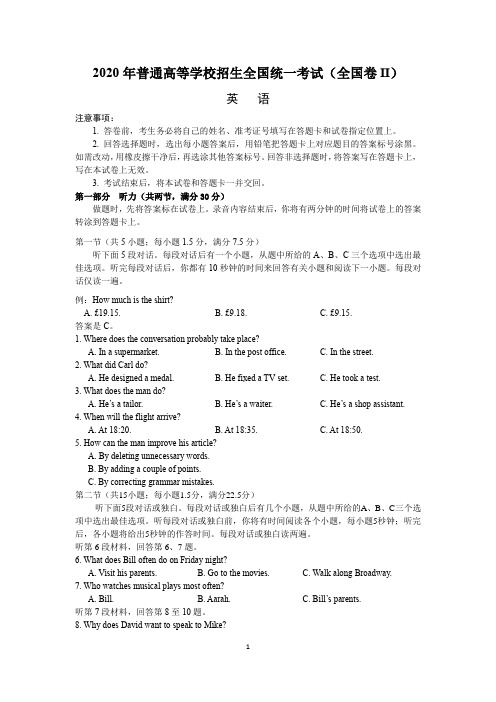
2020年普通高等学校招生全国统一考试(全国卷II)英语注意事项:1. 答卷前,考生务必将自己的姓名、准考证号填写在答题卡和试卷指定位置上。
2. 回答选择题时,选出每小题答案后,用铅笔把答题卡上对应题目的答案标号涂黑。
如需改动,用橡皮擦干净后,再选涂其他答案标号。
回答非选择题时,将答案写在答题卡上,写在本试卷上无效。
3. 考试结束后,将本试卷和答题卡一并交回。
第一部分听力(共两节,满分30分)做题时,先将答案标在试卷上。
录音内容结束后,你将有两分钟的时间将试卷上的答案转涂到答题卡上。
第一节(共5小题;每小题1.5分,满分7.5分)听下面5段对话。
每段对话后有一个小题,从题中所给的A、B、C三个选项中选出最佳选项。
听完每段对话后,你都有10秒钟的时间来回答有关小题和阅读下一小题。
每段对话仅读一遍。
例:How much is the shirt?A. £19.15.B. £9.18.C. £9.15.答案是C。
1. Where does the conversation probably take place?A. In a supermarket.B. In the post office.C. In the street.2. What did Carl do?A. He designed a medal.B. He fixed a TV set.C. He took a test.3. What does the man do?A. He’s a tailor.B. He’s a waiter.C. He’s a shop assistant.4. When will the flight arrive?A. At 18:20.B. At 18:35.C. At 18:50.5. How can the man improve his article?A. By deleting unnecessary words.B. By adding a couple of points.C. By correcting grammar mistakes.第二节(共15小题;每小题1.5分,满分22.5分)听下面5段对话或独白。
2020年普通高等学校招生全国统一考试全国课标卷Ⅱ英语试题
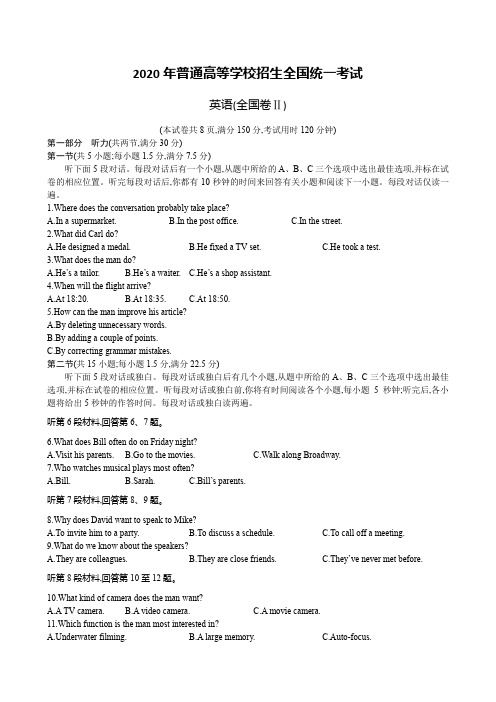
2020年普通高等学校招生全国统一考试英语(全国卷Ⅱ)(本试卷共8页,满分150分,考试用时120分钟)第一部分听力(共两节,满分30分)第一节(共5小题;每小题1.5分,满分7.5分)听下面5段对话。
每段对话后有一个小题,从题中所给的A、B、C三个选项中选出最佳选项,并标在试卷的相应位置。
听完每段对话后,你都有10秒钟的时间来回答有关小题和阅读下一小题。
每段对话仅读一遍。
1.Where does the conversation probably take place?A.In a supermarket.B.In the post office.C.In the street.2.What did Carl do?A.He designed a medal.B.He fixed a TV set.C.He took a test.3.What does the man do?A.He’s a tailor.B.He’s a waiter.C.He’s a shop assistant.4.When will the flight arrive?A.At 18:20.B.At 18:35.C.At 18:50.5.How can the man improve his article?A.By deleting unnecessary words.B.By adding a couple of points.C.By correcting grammar mistakes.第二节(共15小题;每小题1.5分,满分22.5分)听下面5段对话或独白。
每段对话或独白后有几个小题,从题中所给的A、B、C三个选项中选出最佳选项,并标在试卷的相应位置。
听每段对话或独白前,你将有时间阅读各个小题,每小题5秒钟;听完后,各小题将给出5秒钟的作答时间。
每段对话或独白读两遍。
听第6段材料,回答第6、7题。
6.What does Bill often do on Friday night?A.Visit his parents.B.Go to the movies.C.Walk along Broadway.7.Who watches musical plays most often?A.Bill.B.Sarah.C.Bill’s parents.听第7段材料,回答第8、9题。
2020年全国卷Ⅱ英语听力(含答案+听力原文+听力部分解析)
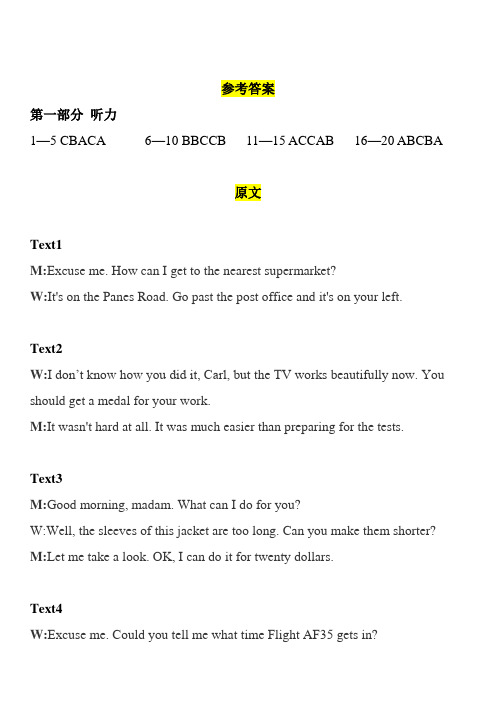
参考答案第一部分听力1—5 CBACA 6—10 BBCCB 11—15 ACCAB 16—20 ABCBA原文Text1M:Excuse me. How can I get to the nearest supermarket?W:It's on the Panes Road. Go past the post office and it's on your left.Text2W:I don’t know how you did it, Carl, but the TV works beautifully now. You should get a medal for your work.M:It wasn't hard at all. It was much easier than preparing for the tests.Text3M:Good morning, madam. What can I do for you?W:Well, the sleeves of this jacket are too long. Can you make them shorter? M:Let me take a look. OK, I can do it for twenty dollars.Text4W:Excuse me. Could you tell me what time Flight AF35 gets in?M:Well, it's due in at 6: 20 p. m., but the announcement said just now that ithas a thirty-minute delay because of the bad weather.Text5M:Miss Miller, could you tell me how I can improve this article? I got B plus. W:It's quite good, actually. The language used is good and the main points are covered.There is just too much repetition. You could have said everything within two pages.Text6W:So, Bill. What do you usually do on the weekend?M:I often go to the movies with friends on Friday night. How about you, Sarah? W:Well, I love seeing musical plays on Broadway with my friends. Have you been to any?M:Not really. I saw one when I moved to New York and another one when my parentscame to visit. But not ever since.Text7W:Hello, Helen Smith speaking, can I help you?M:Hello, this is David. Could I speak to Mike, please?W:I am afraid he is not available at the moment. would you leave a message? M:Yes, I am calling to cancel the meeting we scheduled for this afternoon.W:OK,let me take this down. Could I have your name again?M:Certainly, it's David Stone.Text8W:Can I help you, sir?M:I want to buy a camera.W:Right. We have ordinary cameras, movie cameras and video cameras. They are all digital.M:Well. I am thinking of a video camera.W:Let’s see. How much do you want to spend, sir?M:Oh, I'm not really sure. What is the price?W:Well, that depends on the model and anything else you want to have in it. M:I see.W:How about this one? It has one of the new memory sticks and a protective case forfilming underwater so you can take it when you go diving.M:It doesn't have auto-focus?W:No, it doesn’t.M:That’s OK. The underwater filming is important for me, actually. How much is this?W:It costs 650 euros.M:Oh, that’s a bit expensive for me. Have you got anything similar but less expensive?W:Well, here is the sale of the week. It's excellent for the price. Only 470 eurosand includes...Text9W:A big dog celebrates a big birthday this year. Clifford the Big Red Dog first appeared50 years ago, along with Emily Elizabeth, the little girl who loves him. Today we have Norman Brid well, to talk with NPR's reporter of his d og’s 50th birthday. So, Norman tell us how it all started.M:Well, it was 1962 and I was struggling, not very successful artist in New York. My wife suggested that I try my hand in painting for children's books. So I didten paintings and took them to publishers. I was turned down everywhere, except one publisher, where a young woman told me I wasn’t very good. So if I wanted to paint for a book, I needed to write one on my own.W:So you did?M:Umm, the woman pointed to a painting I’d done, about a little gi rl with a big red dog. And she said “maybe that's the story”. And I went home. And over that weekend,I wrote the story Clifford the Big Red Dog, and was shocked when it was accepted for publication because I'd never written anything before.W:I see. How wonderful!M:Yes, it was. My wife was also at shock when she did realize it wasn’t a dream.But it was just luck.W:And that luck turned into 90 Clifford books that have sold 126 million copies in 13 languages.Text10M:Hello, everyone. Today I'm going to talk about small talk--that is, short conversations people often have with strangers they meet, such exchanges occurring at bus stops, on buses, on a waiting line, almost anywhere thatstrangers gather close together. As a matter of fact, these short conversations are a good way for people to say hello and express friendliness. Such conversations usually cover a wide range of topics. The topics include weather, customer service, movies, TV shows, local sports or latest news. But you should always keep it in your mind that private questions about salaries, family life, religious beliefs and politics should be avoided during these conversations. Besides, it's better to ask open-ended questions. If you ask visitors “Do you like our city? ” They may say simply "Yes ". On the other hand, if you ask, "What do you think of our city? " They would have more freedom to answer it. This kind of question also shows that you're interested in them. If you appear interested in what people are saying, they feel more comfortable talking with you.。
9月全国英语等级考试第二级英语听力试题
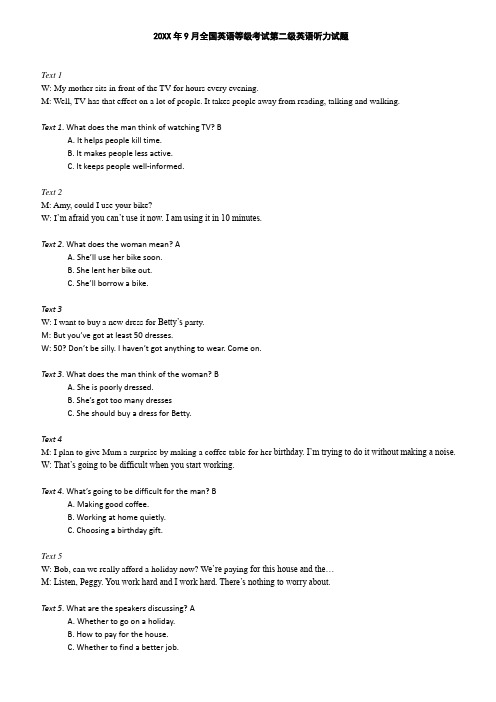
20XX年9月全国英语等级考试第二级英语听力试题Text 1W: My mother sits in front of the TV for hours every evening.M: Well, TV has that effect on a lot of people. It takes people away from reading, talking and walking.Text 1. What does the man think of watching TV? BA. It helps people kill time.B. It makes people less active.C. It keeps people well-informed.Text 2M: Amy, could I use your bike?W: I’m afraid you can’t use it now. I am using it in 10 minutes.Text 2. What does the woman mean? AA. She’ll use her bike soon.B. She lent her bike out.C. She’ll borrow a bike.Text 3W: I want to buy a new dress for Betty’s party.M: But you’ve got at least 50 dresses.W: 50? Don’t be silly. I haven’t got anything to w ear. Come on.Text 3. What does the man think of the woman? BA. She is poorly dressed.B. She’s got too many dressesC. She should buy a dress for Betty.Text 4M: I plan to give Mum a surprise by making a coffee table for her birthday. I’m trying to do it without making a noise. W: That’s going to be difficult when you start working.Text 4. What’s going to be difficult for the man? BA. Making good coffee.B. Working at home quietly.C. Choosing a birthday gift.Text 5W: Bob, can we really afford a holiday now? W e’re paying for this house and the…M: Listen, Peggy. You work hard and I work hard. There’s nothing to worry about.Text 5. What are the speakers discussing? AA. Whether to go on a holiday.B. How to pay for the house.C. Whether to find a better job.Text 6M: Have you seen Mr. Li?W: No, I haven’t. Is he looking for me?M: Yes, he is. He wants to talk to you.W: To me? About what?M: There’s an opening in the sales department. He wants to talk to you about it.W: Oh, that’s great! What kind of job is it?M: He hasn’t told me exactly. But it w ill be a better job than this.W: Thank you for your help.M: Don’t thank me yet! He hasn’t talked to you and he hasn’t chosen you for the job yet.W: I know.Text 6 —6. Who is Mr. Li? CA. The woman’s co-worker.B. The woman’s secretary.C. The woman’s boss.Text 6 —7. What does Mr. Li want to talk to the woman about? AA. A job offer.B. A big sale.C. A new department.Text 7W: Where are you from?M: Australia, from Sidney. I was at university, you know, I just finished and, er… I thought I’d go off around the wor ld for a bit.W: What a long way to come! You have a long holiday, I suppose.M: Well, I finished my studies, you know, and have found a job in a shipping firm. But I have three month s’ holiday before I start work. So I thought I’d just take some time to go around the world. If I need money, I just work where I am, you know, mainly teach English to young children. I used to work in a school and I like children. But at the moment, I’m just having a holiday, wonderful here. I first arrived in Europe a couple of weeks ago. I went to France and, er, I came around… er… through Britain and I went right across to Japan, and then Korea. Now, here I am, in China.W: Wonderful! You must tell us all about your travels, because we’re all very interested. I’ll be working in a foreign trading firm soon. That’ll help me learn something about other countries.M: Well. There’s not much to tell, really. But I can show you photos and postcards.W: But… um... listen. Maybe, if you’d like, you can come to my home and have supper with us and, er…M: Oh. That would be lovely.W: Well, you can tell us all about your stories and we can make you a very nice meal. How about that?M: That would be wonderful. A wonderful Chinese meal! A real Chinese meal! How lovely that’d be! Wonderful!W: Good!Text 7 —8. What is the man doing now? BA. Trying to find a job.B. Traveling around the world.C. Teaching English for money.Text 7 —9. Where will the man be working? BA. In an Australian school.B. In a shipping company.C. In a foreign trading firm.Text 7 —10. What will the speakers do together in the evening? CA. Go sightseeing in the city.B. Eat in a Chinese restaurantC. Have a home-made dinner.Text 8W: Did you hear Jackie’s going to work in another department? We need to have a really good party so that we can send her off really well. So, what shall we do?M: Well, why don’t we have a surprise party, Maggie?W: That’s a good idea. We could go to the Holiday Inn Hotel.M: That’s too expensive. Maybe we can ask Carrie to make a cake.W: Yeah, let’s do that. Perhaps we c ould just give the party in the office and put up some balloons.M: That’s great. I think we should also buy a really big card, a huge card, and we should get everybody to sign it.W: Shall we have some music?M: I was thinking exactly that myself. But…Text 8 —11. What do the speakers decide to do? AA. Ask Carrie for help.B. Buy a huge cake.C. Play cards.Text 8 —12. Who will probably get surprised at the party? CA. Maggie.B. The man.C. Jackie.Text 9M: How are your home-stay families chosen?W: We have special requirements that our families must meet before they are invited to have our international students. We require that the families live within a reasonable distance of the school, have enough living space for the student, and live in a clean, safe and comfortable area. We also work with families who enjoy having international students. We try to match each student with a family as best we can.M: If I stay with a home-stay family, what should I expect?W: The family will treat you as a guest, and you will be expected to obey house rules. All families provide a single or shared room and a choice of meals. In most cases, students will be expected to share the bathroom. Experience has shown us that living with a family is the most interesting and effective way to learn the language. Remember, your home-stay family will have different customs and habits from what perhaps you are used to. Meals will be prepared by the family. All home-stay families are within 30 minutes’ travelling time of the school. The smaller the city, the less time it takes to reach the school.Text 9 —13. What kind of families can be possibly chosen as home-stay families? BA. Good at cooking.B. Close to the school.C. With international background.Text 9 —14. What can an international student expect in a home-stay family? CA. A bathroom of their own.B. No choice of meals.C. A shared bedroom.Text 9 —15. What is the main advantage of staying with a home-stay family? AA. Learning the language better.B. Having more freedom.C. Going to school early.Text 9 —16. What should the student do to get along with the family? CA. Cook for the family.B. Keep his or her habits.C. Follow the house rules.Text 10Good morning, children and parents. Welcome to the Neighbor hood Children’s Club. To celebrate the end of th e school year, we prepare for the children all kinds of gifts, such as sweets, chocolates, bookmarks and pencils. To increase the fun, we’ve hidden them for the children to find around this building.Here’s the information you need to know. First of all, we need all children to put your names down at the desk at that corner, because they’ll be divided into age groups. You haven’t done it ye t, please do it now. Then, if yo u’re ready, pre-school children will be going out of this front door and we will encourage their parents to go with them. Outside this door, you will see flags as the marking for your area. There will be some helpers to direct you. If you are in the first to third grade, you’re going right outside that back door to search in the yard. The parents of this group are welcome to go with the children, but maybe your children don’t need you. Finally, the fourth graders and I, the t hree of you, please follow me down the hall through the double doors and to the other side of the building where you’ll be going to look for your gifts. There are over 200 gifts around this building, and it should be plenty for everyone.Text 10 —17. What’s the purpose of the program? CA. To plan a nice weekend.B. To prepare for New Year’s Day.C. To celebrate the start of a vacation.Text 10 —18. What are the children going to do? AA. Look for the hidden gifts.B. Hide around the building.C. Have a group discussion.Text 10 —19. What are the children required to do before going out of the building? BA. Wait at a corner.B. Give their names at a desk.C. Stay together with their parents.Text 10 —20. Who will go out of the building through the double doors? CA. The preschool children.B. The third grade children.C. The fourth grade children.。
2020年全国卷Ⅱ英语听力(含答案+听力原文+听力部分解析)
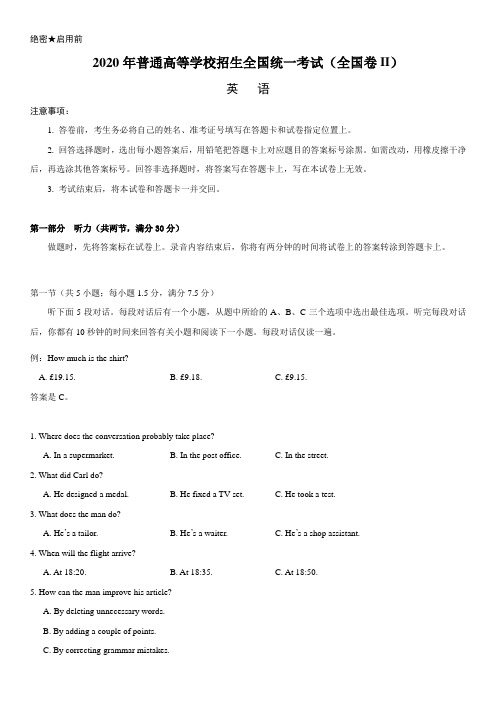
绝密★启用前2020年普通高等学校招生全国统一考试(全国卷II)英语注意事项:1. 答卷前,考生务必将自己的姓名、准考证号填写在答题卡和试卷指定位置上。
2. 回答选择题时,选出每小题答案后,用铅笔把答题卡上对应题目的答案标号涂黑。
如需改动,用橡皮擦干净后,再选涂其他答案标号。
回答非选择题时,将答案写在答题卡上,写在本试卷上无效。
3. 考试结束后,将本试卷和答题卡一并交回。
第一部分听力(共两节,满分30分)做题时,先将答案标在试卷上。
录音内容结束后,你将有两分钟的时间将试卷上的答案转涂到答题卡上。
第一节(共5小题;每小题1.5分,满分7.5分)听下面5段对话。
每段对话后有一个小题,从题中所给的A、B、C三个选项中选出最佳选项。
听完每段对话后,你都有10秒钟的时间来回答有关小题和阅读下一小题。
每段对话仅读一遍。
例:How much is the shirt?A. £19.15.B. £9.18.C. £9.15.答案是C。
1. Where does the conversation probably take place?A. In a supermarket.B. In the post office.C. In the street.2. What did Carl do?A. He designed a medal.B. He fixed a TV set.C. He took a test.3. What does the man do?A. He’s a tailor.B. He’s a waiter.C. He’s a shop assistant.4. When will the flight arrive?A. At 18:20.B. At 18:35.C. At 18:50.5. How can the man improve his article?A. By deleting unnecessary words.B. By adding a couple of points.C. By correcting grammar mistakes.第二节(共15小题;每小题1.5分,满分22.5分)听下面5段对话或独白。
全国英语考试第二级(PETS)听力原文
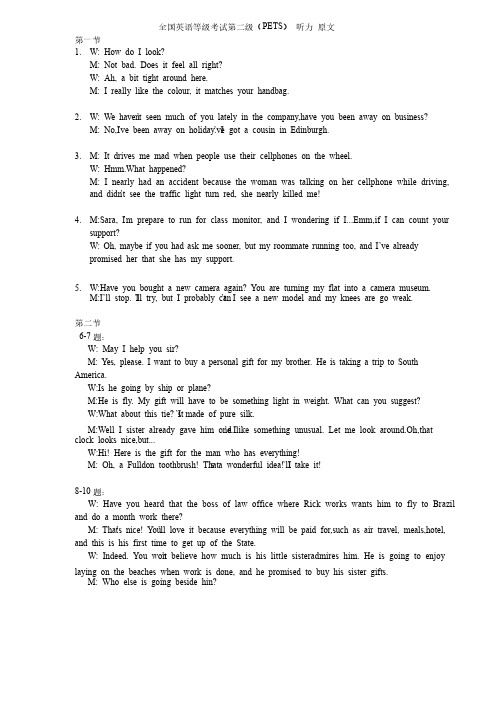
全国英语等级考试第二级(PETS )听力原文第一节1.W: How do I look? M: Not bad. Does it feel all right? W: Ah, a bit tight around here. M: I really like the colour, it matches your handbag. 2.W: We haven ’t seen much of you lately in the company,have you been away on business? M: No,I ’ve been away on holiday. I ’ve got a cousin in Edinburgh. 3.M: It drives me mad when people use their cellphones on the wheel. W: Hmm.What happened? M: I nearly had an accident because the woman was talking on her cellphone while driving, and didn ’t see the traffic light turn red, she nearly killed me! 4.M:Sara, I ’m prepare to run for class monitor, and I wondering if I...Emm,if I can count your support? W: W: Oh, Oh, Oh, maybe maybe maybe if if if you you you had had had ask ask ask me me me sooner, sooner, sooner, but but but my my my roommate roommate roommate running running running too, too, too, and and and I I ’ve ve already already promised her that she has my support. 5.W:Have you bought a new camera again? You are turning my flat into a camera museum. M:I M:I’’ll stop. I’ll try, but I probably can ’t. I see a new model and my knees are go weak. 第二节6-7题:W: May I help you sir? M: M: Y es, Y es, please. please. please. I I I want want want to to to buy buy buy a a a personal personal personal gift gift gift for for for my my my brother. brother. brother. He He He is is is taking taking taking a a a trip trip trip to to to South South America. W:Is he going by ship or plane? M:He is fly. My gift will have to be something light in weight. What can you suggest? W:What about this tie? It ’s made of pure silk. M:Well I sister already gave him one.I ’d like something unusual. Let me look around.Oh,that clock looks nice,but... W:Hi! Here is the gift for the man who has everything! M: Oh, a Fulldon toothbrush! That ’s a wonderful idea! I ’ll take it! 8-10题:W: Have you heard that the boss of law office where Rick works wants him to fly to Brazil and do a month work there? M: That ’s nice! You ’ll love it because everything will be paid for,such as air travel, meals,hotel, and this is his first time to get up of the State. W: Indeed. You won ’t believe how much is his little sisteradmires him. He is going to enjoy laying on the beaches when work is done, and he promised to buy his sister gifts. M: Who else is going beside hin? 托福听力评分标准新托福考试采用真实场景,如模拟大学校园中的动态和交互式环境,试题综合考查听、说、读、写力,考生可充分展示使用英语进行交流的能力。
2020年高考英语听力-2试题、原文及答案分析(带音频)
2020年高考英语听力-2试题、原文及答案分析第一节听下面5段对话。
每段对话后有一个小题,从题中所给的A、B、C三个选项中选出最佳选项。
听完每段对话后,你都有10秒钟的时间来回答有关小题和阅读下一小题。
每段对话仅读一遍。
1. Where are the speakers?A. At a swimming pool.B. In a clothing shop.C. At a school lab.2. What will Tom do next?A. Turn down the music.B. Postpone the show.C. Stop practicing.3. What is the woman busy doing?A. Working on a paper.B. Tidying up the office.C. Organizing a party.4. When will Henry start his vacation?A. This weekend.B. Next week.C. At the end of August.5. What does Donna offer to do for Bill?A. Book a flight for him.B. Drive him to the airport.C. Help him park the car.第二节听下面5段对话或独白。
每段对话或独白后有几个小题,从题中所给的A、B、C三个选项中选出最佳选项。
听每段对话或独白前,你将有时间阅读各个小题,每小题5秒钟;听完后,各小题将给出5秒钟的作答时间。
每段对话或独白读两遍。
听第6段材料,回答第6、7题。
6. Why does Pete call Lucy?A. To say that he’ll be late.B. To tell her about his work.C. To invite her to dinner.7. When is Pete going to see Lucy?A. At 6:00pm.B. At 6:45pm.C. At 8:00pm.听第7段材料,回答第8至10题。
2020年9月pets2英语听力参考答案
2020年9月pets2英语听力参考答案2020年9月PETS2英语听力参考答案听力部分是英语考试中的重要组成部分,它考查考生对英语口语的理解能力。
以下是2020年9月PETS2英语听力考试的参考答案,供考生参考。
Part A: 对话理解1. Q: What is the man going to do?A: He is going to the library to return some books.2. Q: Why does the woman want to buy a new computer?A: Because her old one is too slow.3. Q: What does the woman suggest the man do?A: She suggests he should try to get a part-time job.4. Q: What is the man's opinion about the weather?A: He thinks it's too hot and humid.5. Q: What are the speakers mainly talking about?A: They are mainly talking about a new restaurant in town.Part B: 短文理解6. Q: What is the main topic of the passage?A: The main topic is the importance of water conservation.7. Q: According to the passage, what can be done to save water?A: Use water-saving devices, fix leaks, and take shorter showers.8. Q: What is the speaker's attitude towards water conservation?A: The speaker is supportive and believes it is everyone's responsibility.9. Q: What is the purpose of the passage?A: To raise awareness about the need for water conservation.10. Q: What is the speaker's conclusion about water conservation?A: That it is crucial for the future and should be practiced daily.Part C: 长对话理解11. Q: What is the relationship between the two speakers?A: They are friends who are discussing their weekend plans.12. Q: What does the man want to do on Saturday?A: He wants to go hiking in the mountains.13. Q: Why does the woman suggest going to the beach instead? A: Because the weather forecast predicts rain on Saturday.14. Q: What is the man's opinion about the beach?A: He thinks it's too crowded and prefers the mountains.15. Q: What do they eventually decide to do?A: They decide to go to the beach on Sunday if the weather is good.Part D: 听力填空16. The library opens at ______.A: 9:00 am17. The woman needs to buy a ______ for her project.A: camera18. The man is looking for a ______ to improve his English. A: language partner19. The woman is worried about the ______ of her car.A: maintenance costs20. The speakers are discussing a ______ they attended last night.A: concert请注意,以上答案仅为参考,实际考试中的答案可能会有所不同。
2020年9月全国二级考试英语听力试题
2020年9月PETS2英语听力试题第一节听下面5段对话。
每段对话后有一个小题,从题中所给的A、B、C三个选项中选出最佳选项,并标在试卷的相应位置。
听完每段对话后,你都有10秒钟的时间来回答有关小题和阅读下一小题。
每段对话仅读一遍。
1. Why does Jane become thinner?A. She has been on a diet.B. She has had an illness.C. She has exercised a lot.2. Where are the speakers?A. In a library.B. In a bookshop.C. In a classroom.3. What time does the bus usually arrive?A. 7:30.B. 7:35.C. 7:40.4. What is the probable relationship between the speakers?A. Mother and son.B. Husband and wife.C. Teacher and student.5. What are the speakers talking about?A. Kate’s friends.B. Today’s weather.C. Jim’s weekend.第二节听下面5段对话或独白。
每段对话或独白后有2至4个小题,从题中所给的A、B、C三个选项中选出最佳选项,并标在试卷的相应位置。
听每段对话或独白前,你将有5秒钟的时间阅读各个小题;听完后,各小题将给出5秒钟的作答时间。
每段对话或独白读两遍。
听下面一段对话,回答第6和第7题。
6. What does the woman do?A. She’s a doctor.B. She’s a waitress.C. She’s a teacher.7. What is the man going to do?A. Give up his unhealthy diet.B. Have a further examination.C. Go on sick leave from work.听下面一段对话,回答第8至第10题。
2023年9月全国英语等级考试第二级听力
2023年9月全国英语等级考试第二级听力The following is a script of the 2023 September National English Proficiency Test (NEPT) Level 2 listening section.Part 1: Listen to the conversation and answer the questions.M: Hi, Kate. How was your weekend?W: It was great. I went to the beach with some friends. The weather was perfect, and we had a great time.Q1: What did Kate do over the weekend?Q2: Where did Kate go with her friends?Q3: What was the weather like?Part 2: Listen to the passage and complete the sentences.M: Good morning, everyone. Today I'd like to talk to you about the benefits of exercise. Regular physical activity canhelp improve your overall health. It can reduce the risk of chronic diseases such as heart disease, diabetes, and cancer. In addition, exercise can help boost your mood and reduce stress. It's important to find a form of exercise that you enjoy, whether it's walking, running, swimming, or playing a sport. The key is to be consistent and make physical activity a part of your daily routine.Q4: According to the speaker, what are the benefits of exercise?Q5: What are some examples of physical activities mentioned by the speaker?Part 3: Listen to the conversation and choose the best answer to the question.W: This restaurant is always so crowded. I wish we had made a reservation.M: I know, but it's worth the wait. The food here is amazing.Q6: What does the man think about the restaurant?A) He thinks it's not worth the wait.B) He thinks the food is amazing.C) He thinks they should have made a reservation.Part 4: Listen to the passage and answer the questions.M: Good afternoon, everyone. Today we're going to discuss the importance of time management. Time management is crucial for success, whether it's in the workplace, at school, or in our personal lives. Effective time management can help reduce stress, increase productivity, and improve overall well-being. It's important to prioritize tasks, set realistic goals, and avoid procrastination. By managing our time effectively, we can achieve a better work-life balance and make the most ofour day.Q7: What is the topic of the passage?Q8: According to the speaker, what are the benefits of effective time management?Part 5: Listen to the conversation and choose the best answer to the question.W: I'm thinking of applying for a job in another city, but I'm worried about leaving my family and friends behind.M: It's a tough decision, but sometimes we have to step out of our comfort zone to pursue new opportunities.Q9: What is the man's advice to the woman?A) He advises her to stay in her current city.B) He advises her to pursue new opportunities.C) He advises her to prioritize her family and friends.Part 6: Listen to the passage and complete the sentences.M: Good evening, everyone. Today I'd like to talk to you about the impact of technology on our daily lives. Technology has revolutionized the way we communicate, work, and learn. With the rise of social media, we can easily connect with people from all over the world. In addition, advancements in technology have led to more efficient and productive work environments. However, it's important to be mindful of the negative effects of technology, such as increased screen time and decreased face-to-face interactions. It's crucial to find a balance and use technology in a way that enhances our lives.Q10: What is the speaker's topic?Q11: According to the speaker, what are the positive and negative impacts of technology?This concludes the listening section of the 2023 September National English Proficiency Test (NEPT) Level 2. Thank you for participating, and good luck with the rest ofthe test.。
- 1、下载文档前请自行甄别文档内容的完整性,平台不提供额外的编辑、内容补充、找答案等附加服务。
- 2、"仅部分预览"的文档,不可在线预览部分如存在完整性等问题,可反馈申请退款(可完整预览的文档不适用该条件!)。
- 3、如文档侵犯您的权益,请联系客服反馈,我们会尽快为您处理(人工客服工作时间:9:00-18:30)。
第一节听下面5段对话。
每段对话后有一个小题,从题中所给的A、B、C三个选项中选出最佳选项,并标在试卷的相应位置。
听完每段对话后,你都有10秒钟的时间来回答有关小题和阅读下一小题。
每段对话仅读一遍。
例:1. How much is the shirt?A. £19.15.B. £9.18.C. £9.15.答案:C1. Why does Jane become thinner?A. She has been on a diet.B. She has had an illness.C. She has exercised a lot.2. Where are the speakers?A. In a library.B. In a bookshop.C. In a classroom.3. What time does the bus usually arrive?A. 7:30.B. 7:35.C. 7:40.4. What is the probable relationship between the speakers?A. Mother and son.B. Husband and wife.C. Teacher and student.5. What are the speakers talking about?A. Kate’s friends.B. Today’s weather.C. Jim’s weekend.第二节听下面5段对话或独白,每段对话或独白后有2至4个小题,从题中所给的A、B、C 三个选项中选出最佳选项,并标在试卷的对应位置。
听每段对话或独白前,你将有5秒钟的时间阅读各个小题;听完后,各小题将给出5秒钟的作答时间。
每段对话或独白读两遍。
听下面一段对话,回答第6和第7题。
6. What does the woman do?A. She’s a doctor.B. She’s a waitress.C. She’s a teacher.7. What is the man going to do?A. Give up his unhealthy diet.B. Have a further examination.C. Go on sick leave from work.听下面一段对话,回答第8至第10题。
8. How long has Peter been in London?A. One day.B. Three days.C. About a week.A. It’s not large but warm.B. It’s not so good but cheap.C. It’s not convenient but quiet.10. What is Peter going to do next?A. Get something to eat.B. Ask for another room.C. Have the heating fixed.听下面一段对话,回答第11至第13题。
11. Who is Nat King Cole?A. A pop singer.B. A researcher.C. A bus driver.12. What did the researchers study about bus drivers?A. Their health problems.B. Their facial expressions.C. Their working condition.13. What is proved harmful to t he bus drivers’ health?A. Working overtime.B. Bad thoughts.C. Forced smiles.听下面一段对话,回答第14至第17题。
14. What has Professor Brown been busy with these days?A. Training teachers.B. Teaching students.C. Writing textbooks.15. What does Professor Brown think about what he does?A. It is enjoyable.B. It is hard work.C. It is important.16. At what age did Professor Brown start to learn music?A. Three.B. Six.C. Twelve.17. What is Professor Brown good at in terms of music?A. Playing the piano.B. Writing words to songs.C. Remembering music pieces.听下面一段独白,回答第18至第20题。
18. What is the speaker doing?A. Hosting a radio program.B. Conducting an interview.C. Reporting a piece of news.19. Which country is the largest coal producer in the world?A. Australia.B. The US.20. What do we know about coal-mining jobs in America?A. They’re boring.B. They’re dangerous.C. They’re poorly paid.录音原文(Text 1)M: Jane, are you on a diet? You look thinner than before.W: Not exactly. The day after I began to diet, I got sick. I stayed in the hospital for the last two weeks and lost five kilos.(Text 2)M: Hi. I need to check out this book.W: Sure. May I have your card?M: Okay.W: Sorry, I’m afraid you have to return one of the five books you’ve already borrowed before you check this one out.(Text 3)M: What time is it, Mary? We’ve waited here for about ten minutes.W: It’s 7:40 now.M: Oh, our bus is late today.W: Yes, it should have arrived five minutes ago.(Text 4)W: Bob, turn off the TV. It’s time for bed.M: Most of my classmates say they go to bed after nine o’clock.W: Never mind what time your friends go to bed. I say your bedtime is half past eight. And it’s 8:20 now.(Text 5)W: Hi Jim. Did you have a nice weekend?M: Yes, Kate. It was great. I went camping with my friends in the Catskills.W: Really? How was the weather there?M: It was very nice.(Text 6)W: How long have you been having the pain?M: I first felt it in November last year.W: Well, you should have come in earlier. Have you changed your eating habits in any way?M: No, not really.W: Is there a certain type of food that would cause stronger pain than other types?M: Hmm. Heavy foods like steak or cheese usually bring it on.W: I see. What about if I touch here, does it hurt?M: Ouch! It does hurt. What do you think it is?W: I’m not sure. We need to take an X-ray to see if anything is wrong.M: Okay.(Text 7)W: Hi Peter. Have you been in London long?W: I just arrived. What’s the hotel like?M: It’s okay. Not perfect, but for this price, not bad.W: Why? What’s the matter with it?M: Well, the heating doesn’t always work. And it was freezing in here yesterday. Breakfast is very early in the morning. Today I overslept and missed it completely.W: You overslept? Why was that?M: Well, there’s a man with a boy staying next door. They’ve been here for three days now, an d the boy is really noisy. I didn’t get any sleep.W: Oh no. Well, I don’t know what we can do about the breakfast or other guests. But why don’t you ask the hotel to look at the heating?M: Hmm. Good idea. I’ll talk to them about it right now.(Text 8)W: Do you know Nat King Cole?M: You mean the pop singer? Yeah. What about him?W: In his song “Smile”, he tells people to smile through heartbreak. But now, research suggests that false happiness may just make things worse.M: Really? Tell me more about it.W: Researchers took pictures of bus drivers and then looked into the expressions on their faces. M: They did? What happened then?W: After following the drivers closely, researchers found that the drivers had to force a smile at work. They felt so bad that they wanted to give up their jobs.M: I never imagined it could be so serious. Why is that?W: The report says when people try to hold back bad feelings, it turns out that the feelings become even stronger and last longer.M: Look at my face. Do I smile a real smile?(Text 9)W: Professor Brown, which do you prefer, writing or teacher training?M: Well, I enjoy both very much. In fact, I wouldn’t want to give up either. These days most of my time is spent on writing. I go to the university just two half days a week to work with graduate students.W: What plans do you have for the future?M: Now that we have completed a textbook and its new CD program, we plan to develop more textbooks for other markets. People sometimes say to me, “You work too hard.” The truth is I enjoy what I do, and I don’t consider it to be work.W: What do you like to do that’s not education related?M: I like playing the piano. I’m fortunate to have been born with the ability to play the piano by ear. If I remember a music piece, I can play it. I’m not sure how I do it, but I’ve had that ability since the age of twelve. I took music lessons from the age of six. I also write music. Although I’m a language teacher, I can’t write words to songs. I have to turn to others for the word s. Actually, I have more confidence in my book-writing ability than my song-writing ability.(Text 10)W: Our listener question this week comes from Australia. Jeff Bailey has been listening to our program since 2004. And he wants to know more about coal-mining in the United States. Theproducer of coal after China. Coal is mined in half the states, but Wyoming mines the most, followed by West Virginia, Kentucky, and Pennsylvania. The United States gets about two-thirds of its coal from surface mining rather than underground mining. Surface mining is the name for the different methods that are used to remove coal that is less than sixty meters underground. The United States has about 87,000 coal miners. The jobs pay well, especially for the poor areas where mines are often found. However, the jobs can also be dangerous. The government says more than 100,000 coal miners lost their lives in the past century.参考答案1-5 BABAC 6-10 ABCBC11-15 ABCCA 16-20 BCACB。
